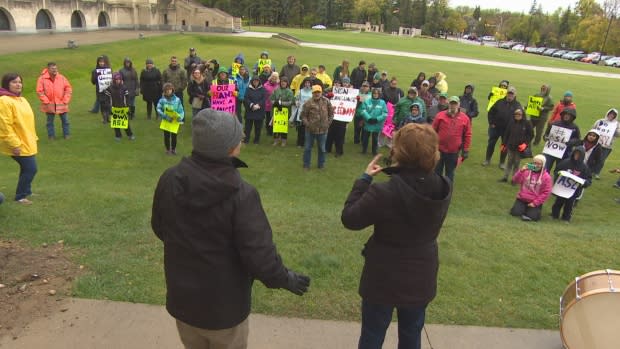Sign language should be 3rd official language, say those at Regina rally
A recognition of sign language as Canada's third official language would make lives easier for those that are deaf and hard of hearing, said those gathered at a rainy Saturday rally in front of Saskatchewan's legislature on Saturday.
Patricia Spicer, an organizer for the rally, was among the crowd of about 50 people, and spoke through an interpreter about the challenges she, as a member of the deaf community, has faced with accessing employment and education.
"Those struggles have been real, and they've been an uphill battle all the time," she said. "And the recognition of [sign language], officially, would mean the uphill battle would get easier."
She feels this move would make a particular difference in ensuring children and adults have access to interpreters who know how to use American Sign Language, its Quebec equivalent LSQ, or even Indigenous Sign Language, which in turn would enhance their quality of life.

"I've had some barriers and some frustrations because people say that they won't hire an interpreter for me, and they say it's my responsibility. I have to pay for it myself," said Spicer.
"But that is not the case. I need to have accessible services without a charge to myself."
She said the rally was held to support the Canadian Association for the Deaf in calling for legislation.
Education in sign language
The Canadian government examined the possibility of adding a third official language in 2016.
Officials in Employment and Social Development Canada looked at sign language legislation in New Zealand, Scotland, Finland and Sweden, and considered how the Canadian government could enact a similar law.
Such legislation, if enacted, would require federal information and services to be provided in English, French and sign language.
NDP MLA for Saskatoon Centre David Forbes, who was at the rally, noted there could be some challenges in making the changes needed to recognize sign language as a third official language. But he said for children, it's a right that they can be educated in a language they can learn and understand.
"We understand the challenges, but really for our children, it needs to be done," he said.
"I do worry we're really going to see a lost generation of students who needed to have supports."

